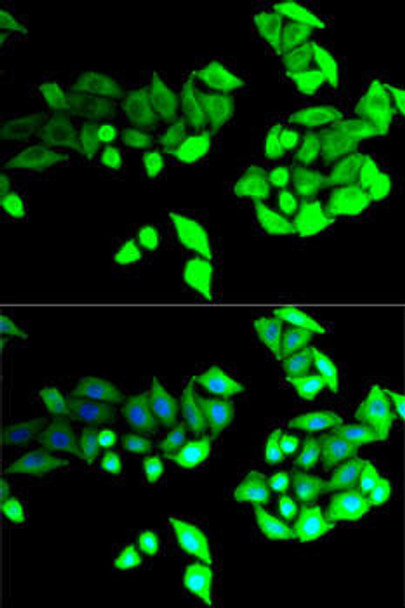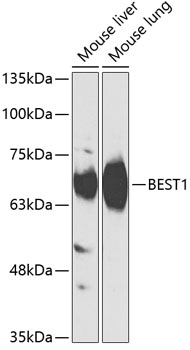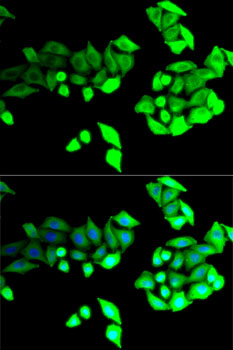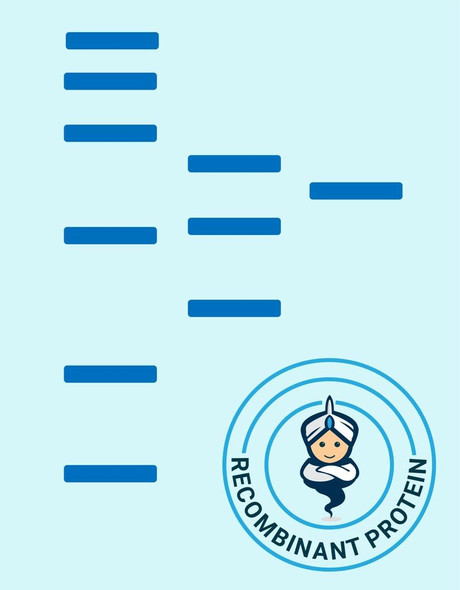Anti-BEST1 Antibody (CAB14070)
- SKU:
- CAB14070
- Product type:
- Antibody
- Reactivity:
- Human
- Mouse
- Host Species:
- Rabbit
- Isotype:
- IgG
- Antibody Type:
- Polyclonal Antibody
- Research Area:
- Signal Transduction
Frequently bought together:
Description
| Antibody Name: | Anti-BEST1 Antibody |
| Antibody SKU: | CAB14070 |
| Antibody Size: | 20uL, 50uL, 100uL |
| Application: | WB IF |
| Reactivity: | Human, Mouse |
| Host Species: | Rabbit |
| Immunogen: | Recombinant fusion protein containing a sequence corresponding to amino acids 376-585 of human BEST1 (NP_004174.1). |
| Application: | WB IF |
| Recommended Dilution: | WB 1:500 - 1:2000 IF 1:50 - 1:200 |
| Reactivity: | Human, Mouse |
| Positive Samples: | Mouse liver, Mouse lung |
| Immunogen: | Recombinant fusion protein containing a sequence corresponding to amino acids 376-585 of human BEST1 (NP_004174.1). |
| Purification Method: | Affinity purification |
| Storage Buffer: | Store at -20°C. Avoid freeze / thaw cycles. Buffer: PBS with 0.02% sodium azide, 50% glycerol, pH7.3. |
| Isotype: | IgG |
| Sequence: | QPNQ EDEE DAHA GIIG RFLG LQSH DHHP PRAN SRTK LLWP KRES LLHE GLPK NHKA AKQN VRGQ EDNK AWKL KAVD AFKS APLY QRPG YYSA PQTP LSPT PMFF PLEP SAPS KLHS VTGI DTKD KSLK TVSS GAKK SFEL LSES DGAL MEHP EVSQ VRRK TVEF NLTD MPEI PENH LKEP LEQS PTNI HTTL KDHM DPYW ALEN RDEA HS |
| Gene ID: | 7439 |
| Uniprot: | O76090 |
| Cellular Location: | Basolateral cell membrane, Cell membrane, Multi-pass membrane protein |
| Calculated MW: | 57kDa/67kDa/69kDa |
| Observed MW: | 68kDa |
| Synonyms: | BEST1, ARB, BEST, BMD, RP50, TU15B, VMD2 |
| Background: | This gene encodes a member of the bestrophin gene family. This small gene family is characterized by proteins with a highly conserved N-terminus with four to six transmembrane domains. Bestrophins may form chloride ion channels or may regulate voltage-gated L-type calcium-ion channels. Bestrophins are generally believed to form calcium-activated chloride-ion channels in epithelial cells but they have also been shown to be highly permeable to bicarbonate ion transport in retinal tissue. Mutations in this gene are responsible for juvenile-onset vitelliform macular dystrophy (VMD2), also known as Best macular dystrophy, in addition to adult-onset vitelliform macular dystrophy (AVMD) and other retinopathies. Alternative splicing results in multiple variants encoding distinct isoforms. |
| UniProt Protein Function: | BEST1: Forms calcium-sensitive chloride channels. Highly permeable to bicarbonate. Defects in BEST1 are the cause of vitelliform macular dystrophy type 2 (VMD2); also known as Best macular dystrophy (BMD). VMD2 is an autosomal dominant form of macular degeneration that usually begins in childhood or adolescence. VMD2 is characterized by typical 'egg-yolk' macular lesions due to abnormal accumulation of lipofuscin within and beneath the retinal pigment epithelium cells. Progression of the disease leads to destruction of the retinal pigment epithelium and vision loss. Defects in BEST1 are the cause of retinitis pigmentosa type 50 (RP50). A retinal dystrophy belonging to the group of pigmentary retinopathies. RP is characterized by retinal pigment deposits visible on fundus examination and primary loss of rod photoreceptor cells followed by secondary loss of cone photoreceptors. Patients typically have night vision blindness and loss of midperipheral visual field. As their condition progresses, they lose their far peripheral visual field and eventually central vision as well. Defects in BEST1 are a cause of adult-onset vitelliform macular dystrophy (AVMD). AVMD is a rare autosomal dominant disorder with incomplete penetrance and highly variable expression. Patients usually become symptomatic in the fourth or fifth decade of life with a protracted disease of decreased visual acuity. Defects in BEST1 are the cause of bestrophinopathy autosomal recessive (ARB). A retinopathy characterized by central visual loss, an absent electro-oculogram light rise, and a reduced electroretinogram. Defects in BEST1 are the cause of vitreoretinochoroidopathy autosomal dominant (ADVIRC). A disorder characterized by vitreoretinochoroidal dystrophy. The clinical presentation is variable and may be associated with cataract, nanophthalmos, microcornea, shallow anterior chamber, and glaucoma. Belongs to the bestrophin family. 3 isoforms of the human protein are produced by alternative splicing. |
| UniProt Protein Details: | Protein type:Membrane protein, multi-pass; Membrane protein, integral; Transporter, ion channel; Transporter; Channel, chloride Chromosomal Location of Human Ortholog: 11q13 Cellular Component: membrane; basolateral plasma membrane; integral to membrane; plasma membrane; cytosol Molecular Function:chloride channel activity Biological Process: visual perception; transepithelial chloride transport; detection of light stimulus involved in visual perception; chloride transport; regulation of calcium ion transport; transmembrane transport Disease: Macular Dystrophy, Vitelliform, 2; Vitreoretinochoroidopathy; Retinitis Pigmentosa 50; Bestrophinopathy, Autosomal Recessive |
| NCBI Summary: | This gene encodes a member of the bestrophin gene family. This small gene family is characterized by proteins with a highly conserved N-terminus with four to six transmembrane domains. Bestrophins may form chloride ion channels or may regulate voltage-gated L-type calcium-ion channels. Bestrophins are generally believed to form calcium-activated chloride-ion channels in epithelial cells but they have also been shown to be highly permeable to bicarbonate ion transport in retinal tissue. Mutations in this gene are responsible for juvenile-onset vitelliform macular dystrophy (VMD2), also known as Best macular dystrophy, in addition to adult-onset vitelliform macular dystrophy (AVMD) and other retinopathies. Alternative splicing results in multiple variants encoding distinct isoforms.[provided by RefSeq, Nov 2008] |
| UniProt Code: | O76090 |
| NCBI GenInfo Identifier: | 6175195 |
| NCBI Gene ID: | 7439 |
| NCBI Accession: | O76090.1 |
| UniProt Secondary Accession: | O76090,O75904, Q53YQ9, Q8IUR9, Q8IZ80, A8K0W6, B7Z3J8 B7Z736, |
| UniProt Related Accession: | O76090 |
| Molecular Weight: | 585 |
| NCBI Full Name: | Bestrophin-1 |
| NCBI Synonym Full Names: | bestrophin 1 |
| NCBI Official Symbol: | BEST1 |
| NCBI Official Synonym Symbols: | ARB; BMD; BEST; RP50; VMD2; TU15B |
| NCBI Protein Information: | bestrophin-1; Best disease; Best1V1Delta2; vitelliform macular dystrophy protein 2 |
| UniProt Protein Name: | Bestrophin-1 |
| UniProt Synonym Protein Names: | TU15B; Vitelliform macular dystrophy protein 2 |
| Protein Family: | Bestrophin |
| UniProt Gene Name: | BEST1 |
| UniProt Entry Name: | BEST1_HUMAN |










